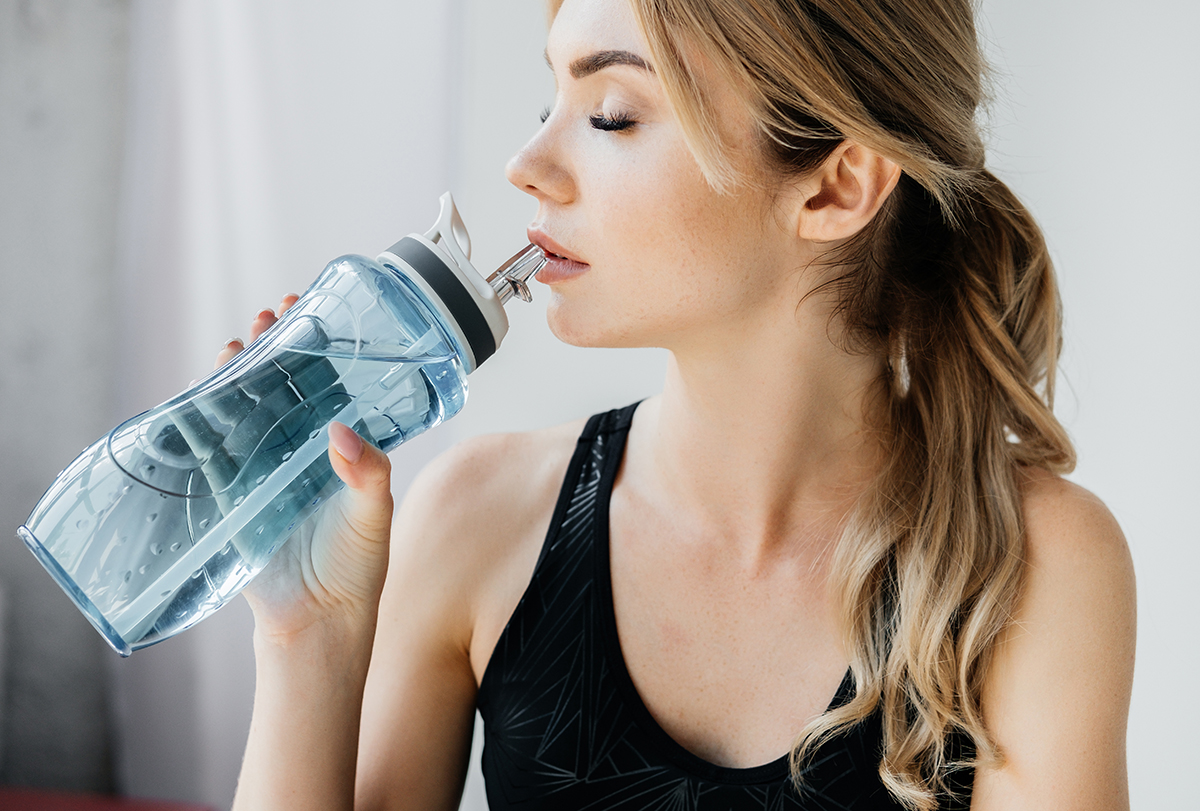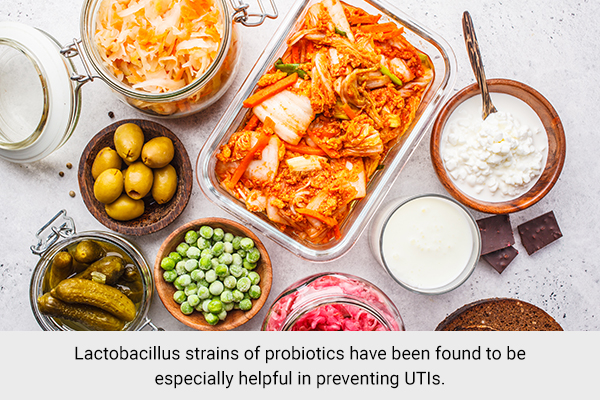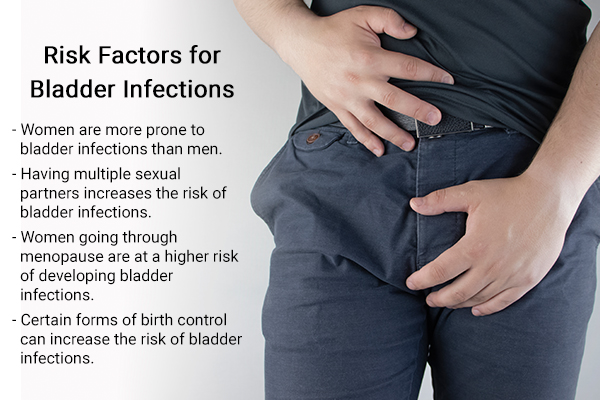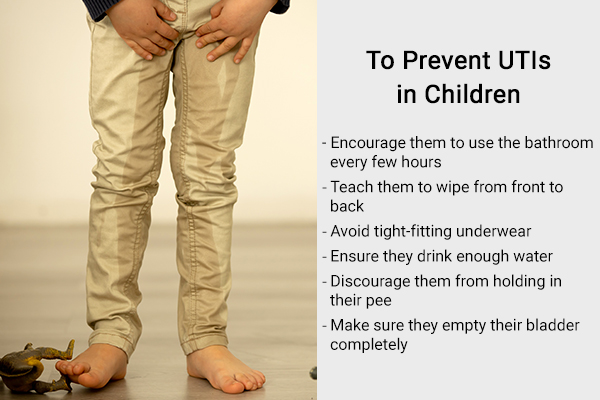In this article:
Urinary tract infections (UTIs) are a common health issue, and bladder infections are one of them. They occur when bacteria infect the bladder, causing symptoms such as a persistent urge to urinate, painful urination, and cloudy or smelly urine.

Left untreated, bladder infections can progress to severe complications such as kidney infections.
There are two types of lower UTIs:
- Cystitis, which is an infection of the bladder
- Urethritis, which is an infection of the urethra (1)
Here are some signs and symptoms of bladder infections: (1)
- Persistent urge to urinate
- Burning sensation while urinating
- Cloudy urine
- Smelly urine
- Blood in the urine
- Pain in the lower abdomen
- Pain during sexual intercourse
- Fatigue
- Incomplete bladder emptying
- Cramping
This article will discuss some effective ways to prevent bladder infections and reduce the risk of recurrence.
How to Prevent a Bladder Infection
Bladder infections can be prevented. The following are simple ways to ensure urinary tract health to avoid bladder infections.
1. Wipe correctly – front to back
When you wipe after using the bathroom, make sure to wipe from front to back. This can help reduce the chance of bacteria from your anus getting into your bladder through your urethra.
The bacteria E. coli are often found around the anus and can cause bladder infections. So, it’s important to avoid any contact with stool to prevent the spread of bacteria. (2)
2. Maintain proper hydration

Not drinking enough fluids can put you at a higher risk of getting a bladder infection or UTI. To avoid this, make sure to drink plenty of fluids throughout the day, so you urinate regularly and get rid of any harmful bacteria.
Drinking 6–8 glasses of water each day is recommended, but you can also consume other beverages such as herbal tea, sparkling water, milk, fresh fruit juices, and smoothies to keep yourself hydrated. (3)
3. Avoid caffeine and alcoholic drinks
If you’re dealing with a bladder infection, it’s best to avoid consuming large amounts of caffeine or alcohol, as they can aggravate your bladder infection and make your symptoms worse.
Both caffeine and alcohol can irritate your bladder, causing discomfort. It’s important to limit your intake of these drinks and opt for other beverages, such as water, herbal tea, or fruit juices, which can help keep you hydrated without exacerbating your symptoms. (3)(4)
4. Don’t hold your pee
It’s not good to hold your urine for too long as this can create a breeding ground for bacteria. Frequent and prolonged holding can increase the risk of developing a bladder infection or UTI.
To avoid such infections, make sure you go to the bathroom when you need to, and don’t hold it for too long. (5)
5. Urinate and clean your genitals after sex
While sexual intercourse may not directly cause bladder infections or UTIs, it can increase the risk of infection. To prevent infections, it is recommended that both men and women urinate after sex to flush out bacteria from the urethra.
However, note that urinating after sex is not a form of contraception or protection against sexually transmitted diseases (STDs).
For women, it is particularly important to urinate after sex because they are more prone to infections. It is also helpful to wash the genital area before and after sex to reduce the spread of bacteria to the bladder through the urethra.
By practicing good hygiene and urinating after sex, you can reduce the risk of bladder infection and UTIs. (6)
6. Avoid scented products
If you’re a woman, one way to keep your vaginal area healthy is by avoiding feminine products that can cause irritation. So, refrain from using deodorants, perfumes, vaginal cleansers, powders, tissues, sprays, bubble baths, and bath oils.
These scented products can disrupt the pH balance in your vagina and interfere with the growth of healthy bacteria, which can increase your risk of infections. (7)
7. Take probiotics

Did you know that your urinary tract is home to good bacteria that help to keep harmful bacteria in check? It’s true! But sometimes, the balance of harmful bacteria is disrupted, leading to issues such as bladder infections.
Luckily, probiotics can help! Probiotics are simply microorganisms that can help to increase the growth of beneficial bacteria in the body. Lactobacillus strains of probiotics have been found to be especially helpful in preventing UTIs.
If you’re looking to add more probiotics to your diet, you can try eating foods such as yogurt, fermented foods, soft cheese, sour pickles, or sourdough bread.
You can also take probiotic supplements or use probiotic suppositories to help restore balance to your urinary tract upon professional advice. (8)
8. Increase your intake of vitamin C
Research suggests that daily intake of 100 mg of ascorbic acid, also known as vitamin C, may help reduce the frequency of urinary infections in pregnant women.
In a clinical trial, pregnant women who took ferrous sulfate, folic acid, and ascorbic acid had a significantly lower occurrence of urinary infections compared to those who took only ferrous sulfate and folic acid.
The study suggests that additional vitamin C intake may be beneficial for pregnant women in populations with a high incidence of urinary infections. (9) Therefore, you can increase your dietary intake of vitamin C to keep UTIs at bay.
Rich sources of vitamin C include citrus fruits, tomatoes, green and red peppers, amla, strawberries, broccoli, Brussels sprouts, turnips, and other leafy vegetables. (10)
9. Use condoms when engaging in sexual intercourse
Using condoms during sexual activity is an effective way to prevent the spread of bacterial infections.
However, it’s important to avoid using flavored or scented condoms as they may contain sugars that can attract bacteria and increase the risk of bacterial growth, ultimately leading to infections. (11)
10. Do not coat your condoms or diaphragms with spermicide
A study found that using condoms coated with spermicides may increase the risk of UTIs caused by Staphylococcus saprophyticus in sexually active young women.
The risk of UTI increased with the frequency of exposure to spermicide-coated condoms, and the majority of UTIs caused by S. saprophyticus were attributed to this exposure.
It is important to note that using condoms as a method of contraception is still recommended to prevent the spread of sexually transmitted infections, but using nonspermicidal condoms may be a better option for those at risk of UTIs. (12)
Risk Factors for Bladder Infections
Bladder infections are more likely to occur in some individuals than others due to various risk factors. These factors include: (13)

- Being female
- Multiple sexual partners
- Menopause
- Certain forms of birth control
- Weak immune system
- Catheter usage
- Certain kidney diseases, such as those that cause urinary tract blockages
- Diabetes
- Enlarged prostate, due to the difficulty in fully emptying the bladder
- Constipation in children
When to See a Doctor
UTIs can be asymptomatic, but if you experience any of the following symptoms, seek medical attention immediately: (2)
- Frequent urge to urinate
- Cloudy urine
- Abdominal pain
- Foul-smelling urine
- Blood in the urine
- Change in urine color
- High temperature with chills
- Drowsiness
- Pregnancy
- Recent surgery
- History of recurrent UTIs (2)
Most-Asked Questions About Bladder Infections
Why do women tend to get more UTIs than men?
Women are more prone to UTIs including bladder infections than men. This is because of the size of the urethra, which brings urine out of the bladder.
Women have a shorter urethra than men. Because of the shorter size, bacteria can easily travel to the bladder.
Also, women’s urethral opening is much closer to the anus, hence making bacterial transmission easier. (14)
How to prevent UTIs in kids?

To prevent UTIs in children, particularly girls, experts advise the following tips:
- Encourage them to use the bathroom every few hours.
- Teach them to wipe from front to back.
- Avoid tight-fitting underwear.
- Ensure they drink enough water.
- Discourage them from holding their pee.
- Make sure they empty their bladder completely.
In babies and young children, symptoms of a UTI may include a high fever, a hot or tender tummy, irritability, and difficulty feeding or eating. Bedwetting or accidents may also be a sign of a UTI in children.
If you notice any of these symptoms, seek medical attention promptly.
What tests are done to diagnose a bladder infection?
The diagnosis of bladder infections involves a number of investigations and standard protocols. These include:
- Urinalysis (examination of urine) and measurement of serum creatinine (a blood test to assess kidney function) are the initial steps in evaluating renal disorders.
- Other urine, blood, and imaging tests (such as ultrasonography, CT, and MRI) may be done in specific circumstances.
How do I stop a beginning bladder infection?
The most common treatments for bladder infections and UTIs are taking antibiotics and increasing fluid intake to help flush out bacteria from the urinary tract. Making changes in daily habits, observing hygiene practices, or using a different method of birth control may also help in preventing future infections. (15)
Does applying a warm pack/heating pad help a bladder infection?
Using a heating pad on your abdomen can help reduce the discomfort and bladder pressure associated with UTIs. (16)
How long does a bladder infection last?
According to experts, once the treatment begins, a bladder infection goes away within 1–2 days.
What foods should I avoid if I have a bladder infection?
You should avoid the following foods if you suffer from bladder problems: (17)
- Food and drinks that contain caffeine
- Other acidic foods such as tomatoes and vinegar
- Certain artificial sweeteners
- Alcoholic drinks
- Carbonated drinks or soda
- Highly spiced foods, especially those with hot pepper
Final Word
There are several steps you can take to prevent bladder infections and UTIs. For instance, it’s important to take regular bathroom breaks and not hold in your pee. Practicing good genital hygiene can also reduce your risk of infection.
It’s important to be aware that kidney infections can be serious and can lead to sepsis if left untreated.
By following these preventive measures, you can reduce your risk of developing bladder infections and UTIs and maintain good urinary tract health.
- Was this article helpful?
- YES, THANKS!NOT REALLY


